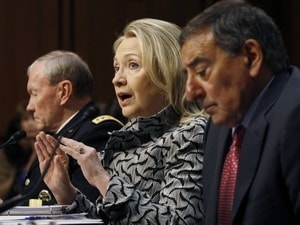US Senate hearing on 1982 Law of the Sea Convention
On May 23, the US Senate Foreign Relations Committee held a hearing on the 1982 United Nations Convention on the Law of the Sea (UNCLOS) with the participation of Secretary of State Hillary Clinton, Secretary of Defense Leon Panetta and Chairman of the US Joint Chiefs of Staff Martin Dempsey.
On May 23, the US Senate Foreign Relations Committee held a hearing on the 1982 United Nations Convention on the Law of the Sea (UNCLOS) with the participation of Secretary of State Hillary Clinton, Secretary of Defense Leon Panetta and Chairman of the US Joint Chiefs of Staff Martin Dempsey.
Although the US has actively participated in the negotiation and drafting of UNCLOS, to date the US Senate has not yet ratified the US to become an official member of this convention.

Hillary Clinton, Leon Panetta and Martin Dempsey attended the hearing.
(Source: Reuters)
Since 1994, the US administrations under Presidents Bill Clinton and George W. Bush have repeatedly requested Senate approval, but have failed due to opposition from a number of conservative Republican senators.
Speaking at the three-hour hearing, three senior US administration officials presented the economic and security benefits of ratifying UNCLOS, as well as the damage that delayed ratification would cause to the United States.
Secretary Clinton said the United States "needs to stop standing on the sidelines and start taking advantage of the tremendous benefits the Convention brings to the United States and the business community."
She said that in the past, US oil and gas companies did not have enough technology to take advantage of the provisions of the Convention on the Continental Shelf, but now those companies have the ability and are ready to exploit these areas.
She also said that if the US joined the Convention, it would "gain international recognition of its sovereign rights, including the use of procedures set out in the Convention, allowing oil companies a legal basis to carry out exploitation."
Secretary Clinton dismissed the arguments of those opposed to UNCLOS, saying that this opposition was based on "ideology and myth." She affirmed that the convention had the support of all presidents of both parties, including Republican President George W. Bush, American businesses, the energy and shipping industries, as well as environmental organizations.
Secretary Panetta has been a strong supporter of ratifying UNCLOS, arguing that as a nation with one of the world's longest coastlines and the largest extended continental shelf, the United States would benefit most from joining UNCLOS.
He also said that this would create a legal basis for the US to have freedom of navigation and global access for US commercial and military vessels, aircraft and undersea fiber optic cables, instead of having to exercise freedom of navigation through international customs as it currently does.
The Chairman of the US Joint Chiefs of Staff, General Dempsey, said that UNCLOS will be an important tool for the US to resolve conflicts peacefully with a lower risk of escalation. He said that the US is currently the only permanent member of the UN Security Council and the only Arctic country not a party to UNCLOS, so it is limited in its ability to build coalitions for important international security efforts.
At the hearing, some Republican congressmen remained staunchly opposed to joining UNCLOS and were concerned about some consequences, such as the US having to participate in a commission with more than 160 members where the US would not have any veto power.
Senator John Kerry, Chairman of the Senate Foreign Relations Committee and chair of the hearing, said he would not bring the ratification of UNCLOS to a vote in the Senate before the 2012 election, as many senators were afraid to vote on a sensitive issue while campaigning./.
According to (TTXVN) - DT






